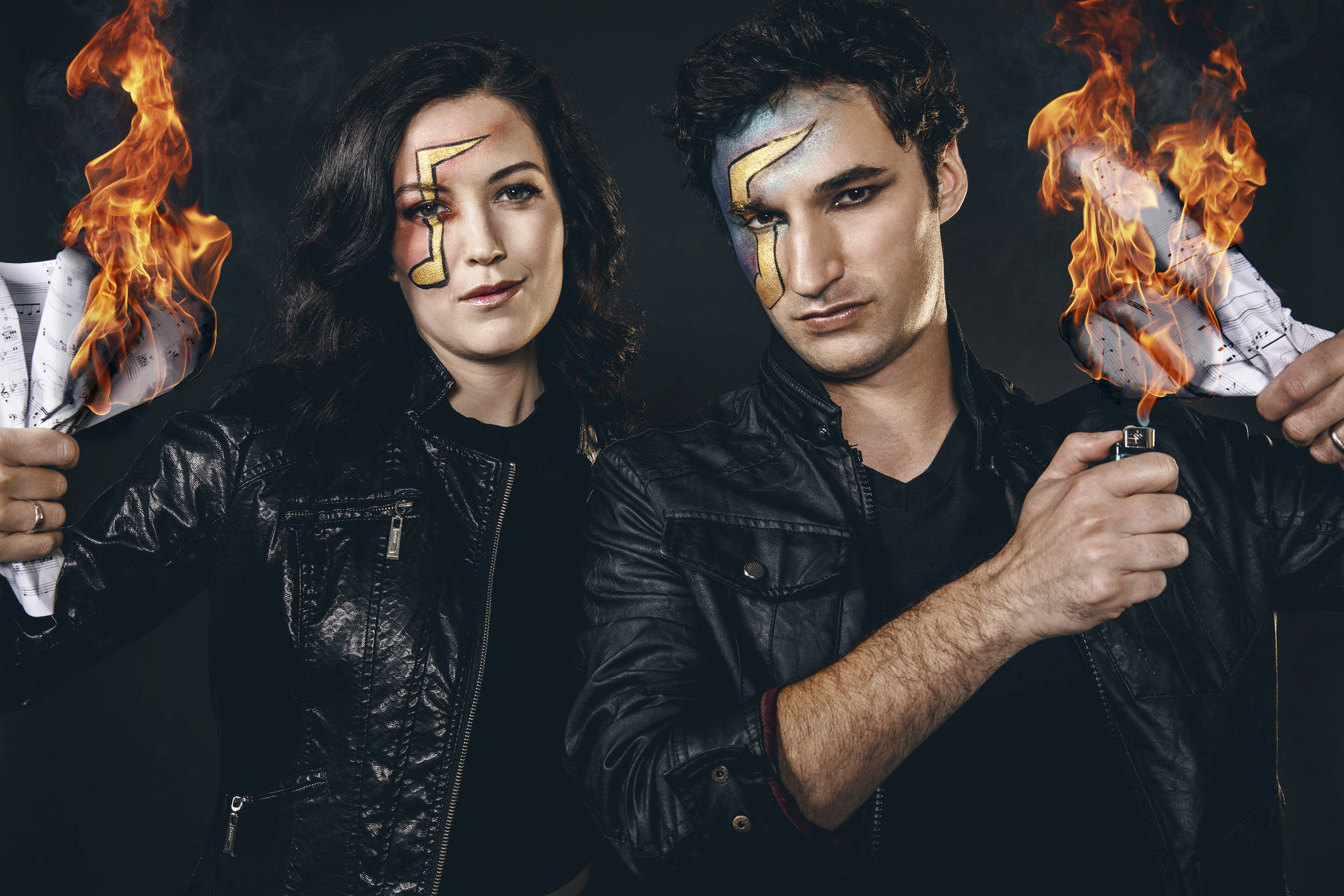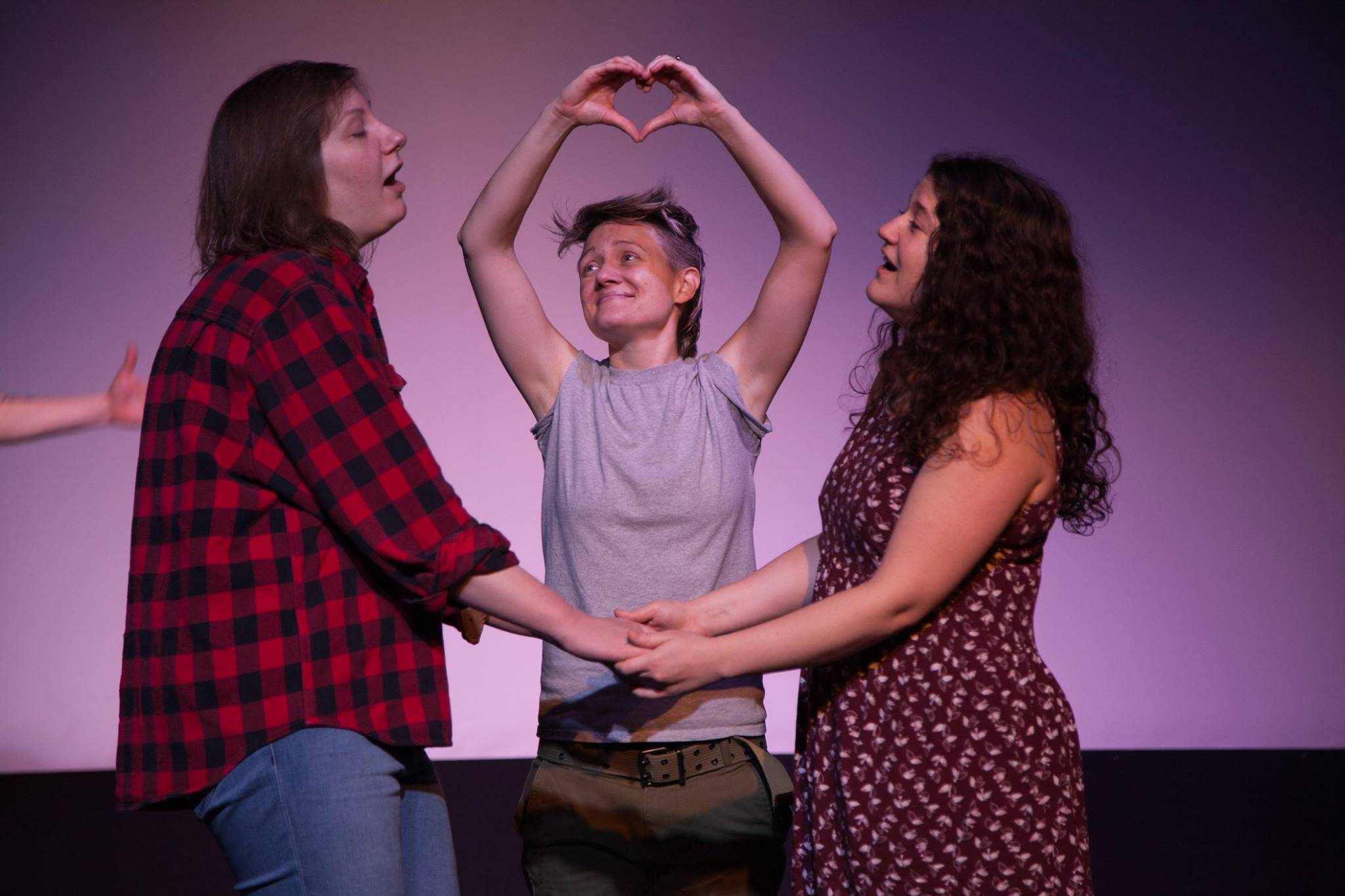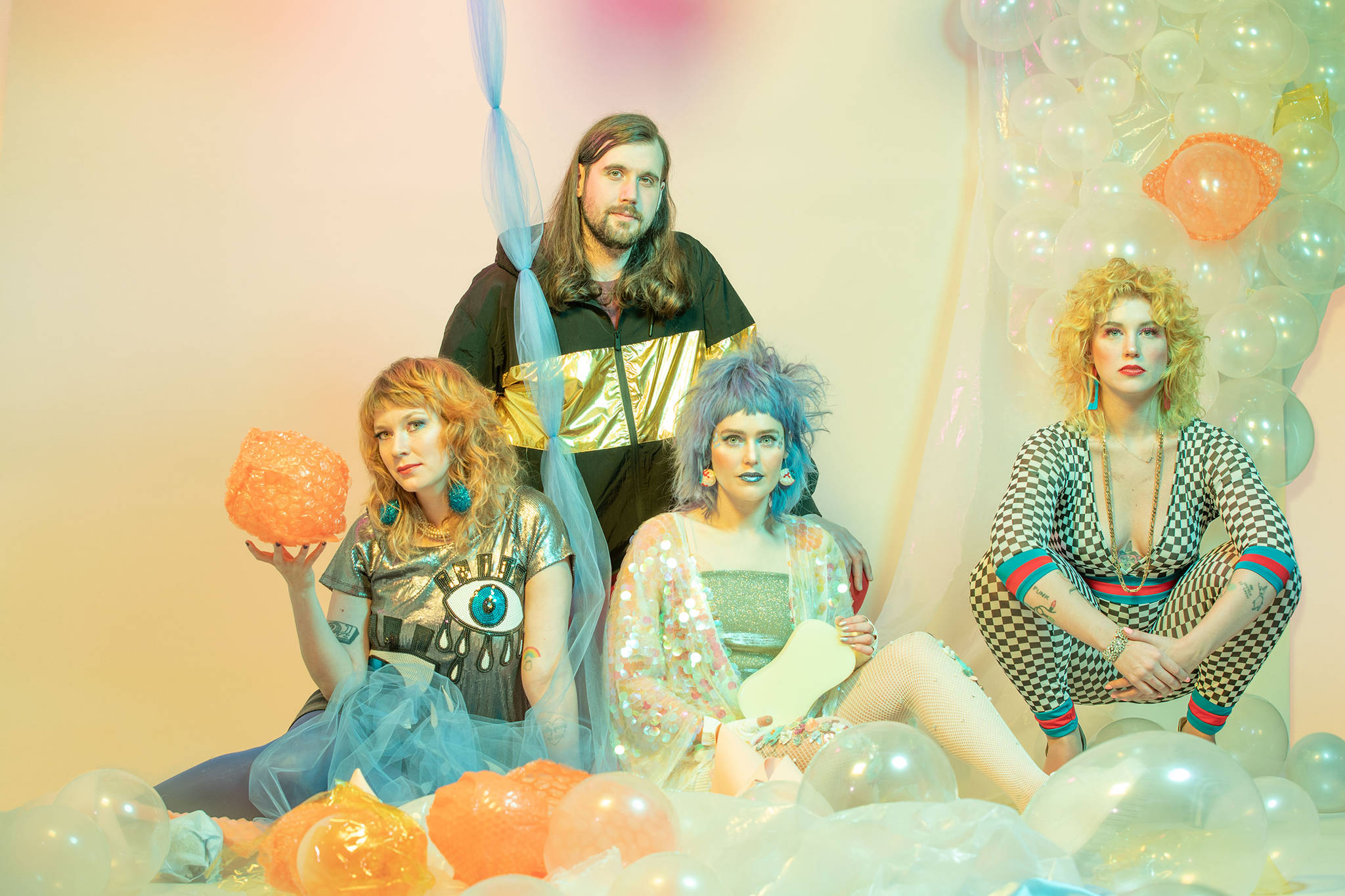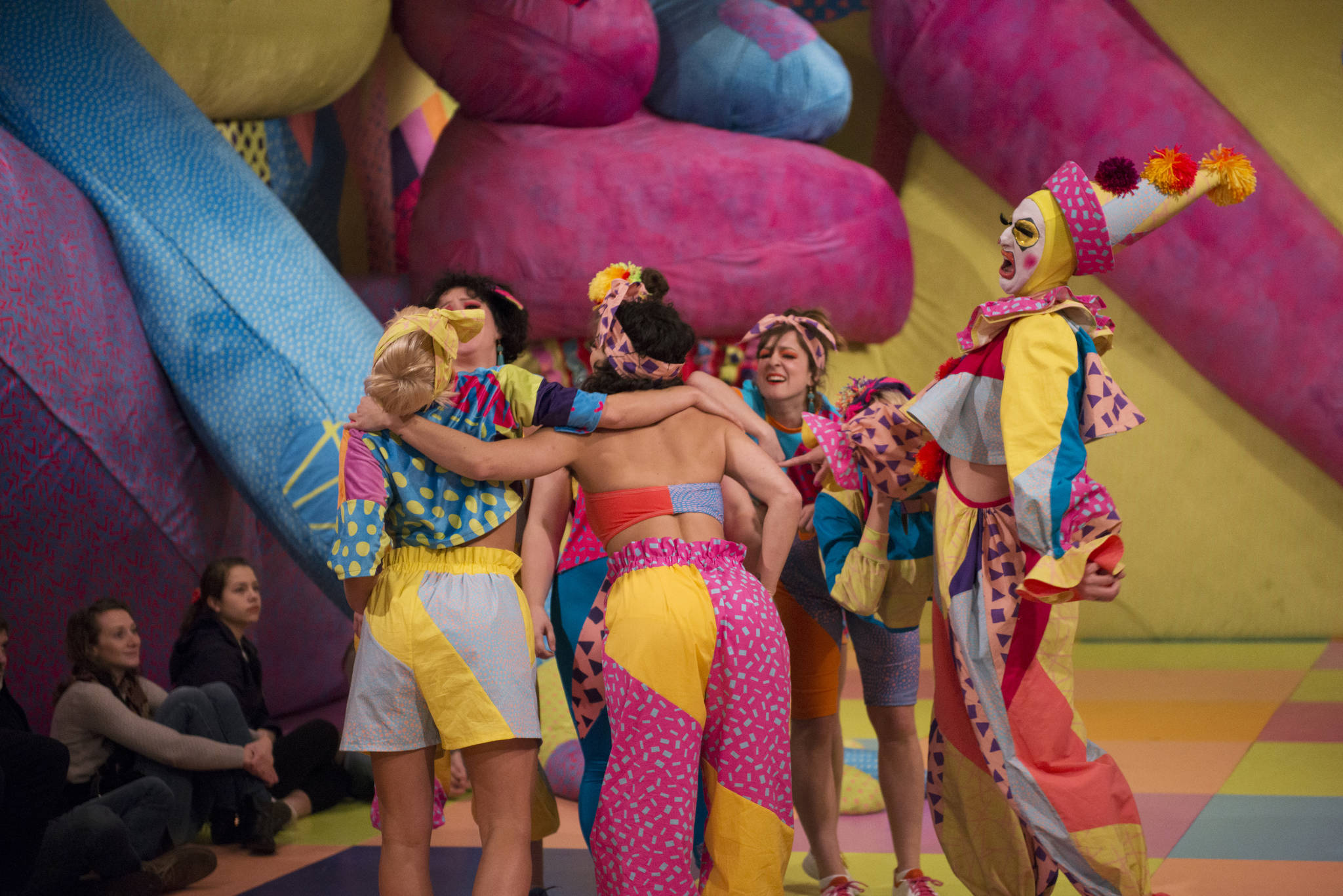There’s something inherently ridiculous about musicals: People are spontaneously breaking into narrative song and dance, and NOBODY finds this weird. It’s a super-silly construct, and one that gets heightened even further on Off Book: The Improvised Musical podcast. Each week, veteran Los Angeles improvisers Jessica McKenna and Zach Reino invite guests into the studio and create a full-blown musical out of thin air. (Past guests include comedians Paul F. Tompkins, Scott Aukerman, Nicole Parker, and Chris Redd.) With the help of pianist Scott Passarella (who can seamlessly switch genre styles in the blink of an eye), the duo creates audio theatrical works about everything from locomotive murder mysteries and doggy Christmas pageants to time-traveling pilots and superhero moms. Since launching in July 2017, McKenna and Reino’s ultra-quick wits, musical sensibilities, and unabashed theater-nerd exuberance have made each episode a joy.
Seattleites can experience that hilarity live when Off Book heads to Bumbershoot this Saturday, Sept. 1 for a live performance (4 p.m. at the Charlotte Martin Theatre). (If we’re being totally honest, it’s the one thing on this year’s rather meh Bumbershoot lineup that I’m overjoyed to see.) To prepare for the mischievous musical mayhem, we chatted with McKenna and Reino about what makes for a good episode, taking the show in front of an audience, and Cats.
How did you two first connect in the improv world?
JM: We met in early 2011. We were both in a self-started practice group born out of Upright Citizens Brigade. Zach was on a team that had been together for like nine months and they had some members leave, and a friend of mine from college was on the team, so I joined the team. Then over time, that team would freestyle-rap in our shows, and that’s when Zach and I realized we both had a musical-comedy interest.
ZR: From there, we ended up both becoming house performers at Upright Citizens Brigade. We realized that we had a lot of comedic sensibilities in common; we would continually want to do the same things. So we ended up doing some one-off shows there and filming some bits and putting them up places, and then that kind of spiraled to us working as a writing partnership. Fast-forward to this podcast.
Was there a point when you realized you both shared a love of musical theater?
JM: Probably pretty early. As that team became a more musical team, it was clear that Zach and I had done a lot of musicals growing up. We sort of had the experience where we went to college and studied theater. And while we had grown up doing more musical theater, we discovered comedy. We both had pretty important college comedy experiences which sort of led us away from doing real musical theater. That, and the reality of Zach being like, “Oh, I don’t want to be in dance classes all the time,” and me being like, “I don’t think I’m good enough to really peruse musical theater … ”
ZR: Jess is being nice to me. I had the same realization, like, “Oh, there are people who sing much better than I do and always will, and Broadway is maybe not the place for me to strike out in my initial career.” But comedy seemed to be a kind of niche that we were really well suited for.
And then when we got to L.A., we realized that very few people had even the amount of musical-theater background that we had. And combining that with the comedy backgrounds we had, we were kind of uniquely qualified to do musical improv at the time. There are now many, many more people coming up and learning this, but at the time there were significantly less.
I mean this in the least insulting way, but there’s a different bar for being a super good singer for an improviser and for a Broadway star.
ZR: [Laughs] 100 percent true.
JM: Not insulting at all.
Outside of Nicole Parker (Mad TV alum who also starred in Broadway shows), there aren’t a lot of people who can do comedy and go do Wicked.
ZR: There are like six people on the planet who fill both of those boxes, and Nicole is like five of those six people.
What are the keys to a good episode of Off Book and good musical improv in general?
JM: I think for us, this musical background and stuff is still second to us following the funny first. So we are trying to tell a narrative story, but we are also interested in derailing that story if we need to do a song about Wetzel’s Pretzels. We’re following the fun. Like what is the funniest thing we could do right now, and less concerned about plot. And then within that, who are these characters that we get to play?
And then hopefully between all of our musical knowledge, there’s some musical variety in the episode. Just because I say we follow the funny doesn’t mean that every song has to be fast and upbeat. Sometimes we can do a really comedic ballad … or sometimes I’m one who’ll be like, this is just a straight-up earnest ballad. And that’s definitely when I’m scratching my itch of uhhhh … what if this was kind of emotional? [Laughs]
ZR: Part of what I love about doing the show—and getting to do so many of them—is that the target for what the best version of it is moves a lot in a very good way. I think we’re always trying to do the best version of whatever this particular episode is. Like if we’re doing a musical Stranger Things, the target for the best version of that is different than what the best musical version of an episode of Survivor is.
The things that are consistent throughout is that it has to be funny first; we always want to have good lyrics, good harmony; get the guest involved as much as possible, because they’re the variable that keeps it fresh and gives the show the variety that it has. On top of that, there’s a lot of the stuff that Jess talked about: sometimes it can get really emotional, sometimes we can have really fun plot twists, all that is great. But I think it is kind of specific to whatever that particular story happens to want or need.
Speaking to that, some of my favorite moments on the show have been when you very clearly find the “game” in the song. Like intentional non-rhyming fake out to avoid reference to the movie Cars on “Behind Sondheim” or rattling off a litany of dog film references in a tune on “O Little Town of Doggywood.”
JM: Bless you for those references.
What elements change when doing the show live in front of a crowd as opposed to the traditional studio setting?
ZR: Not as much as you might think. Audience response as a driving force is always a little bit different in the room than when it’s just the three of us and a guest around the table. Because sometimes you get reactions to things that you don’t think you would, and that—as a comedian and improviser responding to the space—is always a fun adventure. To be like, “Oh, without outside influence, I wouldn’t have pulled on that thread to see where it leads, but with an audience here, maybe I will.”
JM: We do a segment that’s specific to the live show where we do a talkback at the end. And honestly, the audience gets to see that there aren’t, like, secret hand signals. I think it’s good for us to show the audience that the podcast really is exactly as improvised as it sounds.
ZR: We’re not cheating.
JM: But I also like that they can see us break, they can see my reaction to Zach starting himself on an insane listing patter song, where I’m just like oh my gosh, he’s gonna go for it! We’re live performers, so the live shows are a blast.
ZR: Obviously, it’s super fun in the studio. Sometimes we’ll get in a very laughy mood or get a guest who happens to laugh a lot—like Paul F. Tompkins—but there is truly no substitute for performing live in front of an audience and feed off that energy.
Do you have any favorite moments in the episodes or ones you think would actually make for a decent staged musical if you wrote it out?
JM: I don’t know if it’d make an amazing stage musical, but for real the Mary Sohn episode (“The Kids Are at Night”)—I was like, “I could straight-up film this right now. And it would be a great small indie movie about kids on an adventure to 7/11 and figuring out what it is to grow up and stuff.” I thing the “Doggywood” Christmas episode could obviously just be an animated movie right now.
ZR: Those were the two that came to my mind too. Weirdly, Nicole Parker’s episode (“Attorney At Love”) is like a bizzaro version of Legally Blonde, but less of a fish out of water story.
JM: Actually—this is a bummer because it’s behind the paywall—but Scott Aukerman’s episode (“Murder on the Picturesque Express”) is all on a train, so that would really lend itself to being staged.
ZR: Oh hell yeah!
JM: And there are tons characters, which are fun.
ZR: Weirdly, “Run to You Bride” is also a pretty compact setting. We almost never talk about that one. It is definitely behind the paywall.
JM: This recent one with Bryan Safi (“Thank God Superstar”) is a more PG-13 version of Sing, and could probably translate pretty easily.
ZR: What we do find pretty consistently is that we think most of our episodes are pretty great cartoons. They’re pretty great animated musicals and trickier live-action musicals.
It’s hard to do time pilots on stage.
ZR: It’s hard to do time pilots and it’s hard to do a bunch of dogs on a train. [Laughs]
I mean, you’d just do it like Cats.
ZR: You could do it very much like Cats, and just wear a bunch of spandex and just force the audience to deal with it for 2 ½ hours.
Is there anything else you’d like to add?
JM: Just that you don’t have to like musicals to like our podcast, and you don’t have to have listened to our podcast to come see it live. It’s not a podcast that requires any previous exposure. Don’t be scared of us.
Off Book at Bumbershoot
Sat., Sept. 1 at 4 p.m. | Stubhub Comedy Stage (Charlotte Martin Theatre) | $130–$775 | bumbershoot.com








